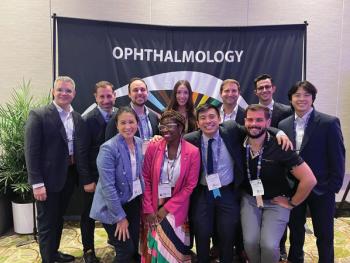
- Modern Retina Summer 2023
- Volume 3
- Issue 2
DOVETAIL study: Anti–IL-6 monoclonal antibody is effective in treating uveitic macular edema
As a nonsteroid treatment, RG6179 could open new methods for controlling inflammation with fewer adverse effects.
Reviewed by Sumit Sharma, MD
Preliminary results from the phase 1 DOVETAIL study found that intravitreal injection of RG6179 (ROCHE), a humanized anti–IL-6 antibody, resulted in improved vision and retinal thickness and was well tolerated for treating uveitic macular edema, according to first author Sumit Sharma, MD. of the Cole Eye Institute, Cleveland Clinic, Ohio.
Uveitic macular edema, the most common vision-threatening complication associated with noninfectious uveitis, occurs in one-third of patients with uveitis.
Even with appropriate treatment to control the associated inflammation, uveitic macular edema persists in about 40% of cases. Because of this, Sharma and colleagues began investigating the use of a humanized anti–IL-6 antibody to circumvent the adverse effects caused by steroid treatment in this patient population.
Dysregulated IL-6 seems an appropriate treatment target because it is a key player in the development of macular edema. It recruits inflammatory cells and causes infiltration into surrounding tissues. This leads to a breakdown of the blood-retinal barrier and vascular leakage, creating macular edema. RG6179, engineered for intravitreal use, inhibits the IL-6 cis and trans signaling pathways and restores the integrity of the blood-retinal barrier.
DOVETAIL study
This study is an ongoing, multipart, multicenter, open-label, nonrandomized, phase 1 trial. Presently, approximately 85 patients (mean age,
63.5 years) with uveitic macular edema or diabetic macular edema have been treated with RG6179.
Sharma reported the preliminary data from part 4 of the ongoing clinical trial collected from 37 patients with uveitic macular edema. In this part of the study, 3 doses of RG6179 were tested as monotherapy:
0.25 mg, 1 mg, and 2.5 mg administered monthly for 3 months.
The primary outcome was to determine the safety and tolerability of the treatment in adults 18 years and older. The secondary objective was to determine the efficacy, the pharmacokinetics of the treatment, and the presence of antidrug antibodies.
RG6179 results
The results indicated that the lowest doses resulted in the highest letter increase in the best-corrected visual acuity, followed by the 1-mg and
2.5-mg doses.
The 0.25-mg dose resulted in 36% of patients achieving a 15 or more letter increase, the 1-mg dose 27%, and the 2.5-mg dose 25%. Concurrent reductions in the central retinal thickness accompanied the changes in vision.
Sharma reported that by week 12, 53% of patients had no intraretinal fluid and 100% had no subretinal fluid.
Adverse events
The 3 doses of RG6179 were well tolerated in all patients. Forty-four ocular adverse events were reported in the study eye of 18 of 37 patients (49%). Intraocular inflammation was the most often seen adverse event, followed by progressive cataracts in 3 patients with preexisting cataracts. No new cataracts developed. No patients had sustained treatment-related IOP increases, occlusive retinal vasculitis, or systemic adverse events.
One treatment-related event occurred in 1 patient in whom the visual acuity reduced transiently beginning on day 6 and lasted for 8 days.
One case of worsening of uveitis occurred beginning on day 14. The patient discontinued use of the drug. Antidrug antibodies developed in 2 patients in the 2.5-mg group, and no clinical effects were seen. No such cases developed with the lower doses.
Sharma also reported that no ocular adverse events commonly associated with steroids developed.
Study takeaways
The results indicated that patients with RG6179 had improvements in vision and retinal thickness in all the dosing cohorts. The treatment was well tolerated, and no serious
treatment-related adverse events, increases in IOP, or new cataracts developed in association with treatment.
Based on these phase 1 findings, and supported by the pharmacokinetic data, a phase 1/2/3 clinical trial program with RG6179 is ongoing.
“It is exciting to see a new class of therapeutics for the treatment of uveitic macular edema in development. [Although] steroids work great to control inflammation, their use is limited by [adverse] effects of glaucoma and cataracts. A new therapeutic without these risks and that controls inflammation is needed,” Sharma concluded. •
Sumit Sharma, MD
E: sumitsharma.md@gmail.com
Sharma, MD, serves as a consultant for Genentech/Roche, sponsors of the study. He also reports serving as a consultant for AbbVie, Alimera Sciences, Apellis Pharmaceuticals, Bausch + Lomb, EyePoint Pharmaceuticals, Regeneron Pharmaceuticals, and REGENXBIO. The DOVETAIL study was funded by F. Hoffmann-La Roche Ltd.
Articles in this issue
over 2 years ago
Study finds significant variance across imaging modalitiesover 2 years ago
New VEGF trap for wet AMD takes aim at VEGF-C and VEGF-Dover 2 years ago
Is complement therapy the path forward for geographic atrophy?over 2 years ago
Experts detail innovative therapies for DME and neovascular AMDNewsletter
Keep your retina practice on the forefront—subscribe for expert analysis and emerging trends in retinal disease management.












































